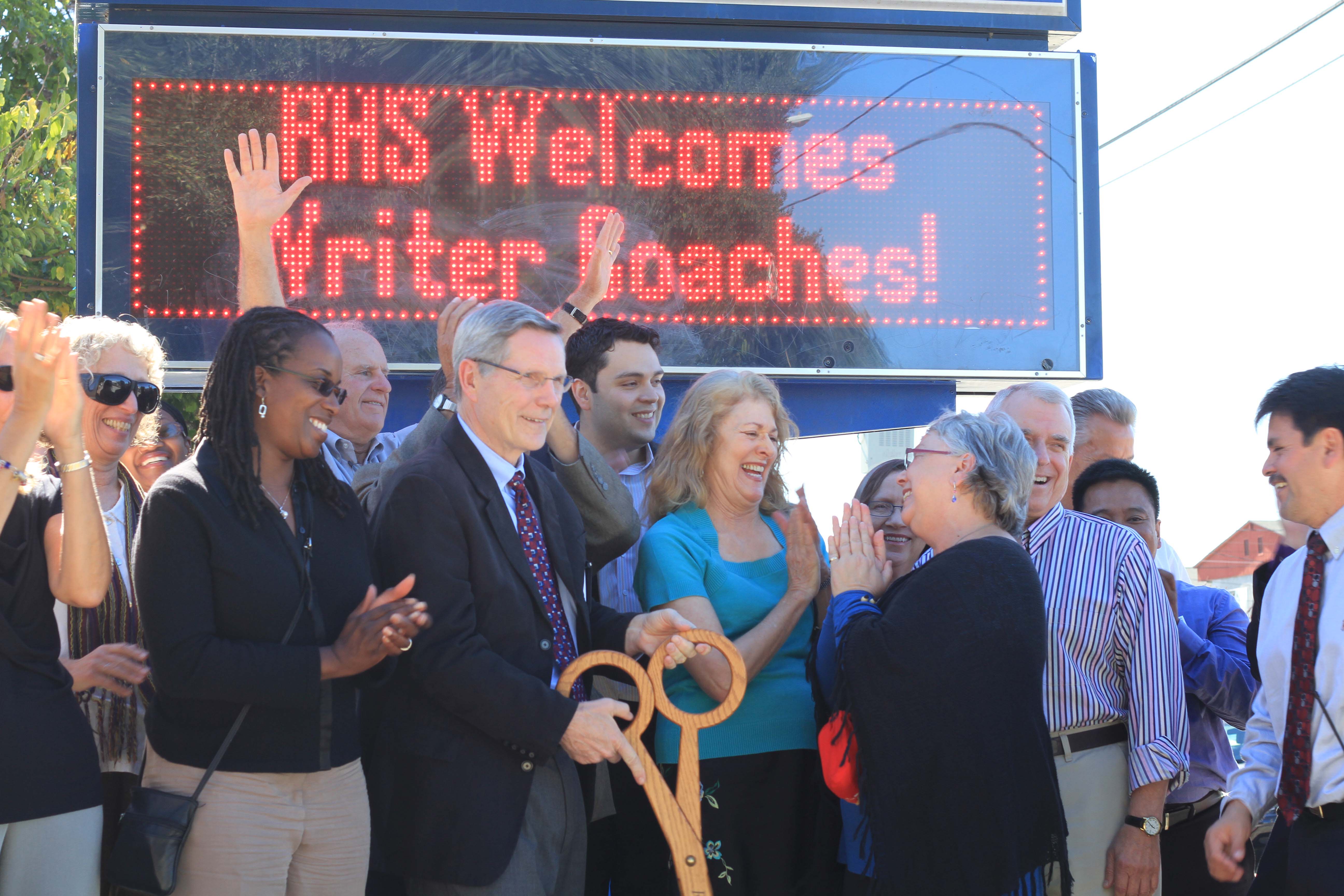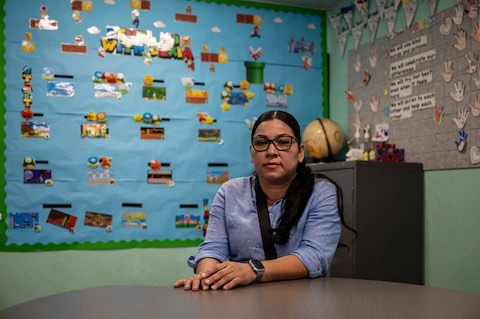
05 Nov In Richmond, English Learners Get an Assist From Volunteers
News Feature, Edgardo Cervano-Soto
“Every good story has a conflict,” says the teacher as she draws a story plot map for her students. Arleth and Saul, both 14 and freshmen at Richmond High, follow along, drawing the jagged map onto their notebooks, labeling the exposition, rising action and climax. The lesson has Arleth, Saul and 25 of their English Language Development (ELD) Level 4 classmates learning, and in some cases, re-learning the basics of writing.
ELD students, also known as English Language Learners, are the fastest growing group of students in American public schools. A 2008 study from the Migration Policy Institute, a non-profit, non-partisan think tank on the East Coast, estimated 5.3 million K-12 students in the U.S. are English Learners, with 1.6 million in California alone.
ELD students consistently rank among the lowest in state test scores, high school graduation and college attendance rates. What’s more, the demographics of this population are changing dramatically.
It is common perception that all ELD students are immigrants and non-native English speakers. However, that is far from reality. The Urban Institute in a 2005 study stated that more than half of ELD students in high school are native-born Americans, with Spanish speaking students comprising the majority.
At Richmond High School, Saul and Arleth are among the 45 percent of students classified as English Language Learners.
Saul, whose parents are both from Mexico, was born in Washington but relocated to Richmond because his mother disliked the cold. Of average height and lean, Saul’s choice of black shin high socks speaks to his interest in sports, specifically soccer. He doesn’t read much outside of school, he admits, other than his favorite video game and skateboard magazines. It’s not that he hates doing so, says Saul, it just “depends if I’m in the mood.”
Arleth was born in Berkeley and her parents are also from Mexico – her mother moved to the U.S. at the age of 14 and graduated from Richmond High. A petite teenager and the oldest of five siblings, Arleth has an interest in pencil drawing and photography. Outside of class, she writes often, usually letters to family. It’s one way she’s maintained contact with a cousin soon to be released from juvenile detention in Reno. Arleth has confidence in her writing abilities, and says she feels some resentment about being in ELD classes for multiple years. “I didn’t learn much in middle school or have anyone look over my writing,” she says.
In addition to ELD 4, the students – 27 in all – are enrolled in English 1, a kind of writing and reading boot camp. The heavy emphasis on language classes means ELD students can’t take elective courses.
Principal Julio Franco is determined to improve the rate of learning for ELD students at Richmond High. Recently, Franco and Dr. Bruce Harter, superintendent of West Contra Costa Unified School District (WCCUSD), contracted with Writer Coach Connection (WCC), a one-on-one, in-classroom mentoring program that matches students with trained volunteers.
In October, WCC celebrated its expansion to Richmond High with a ribbon cutting ceremony, and 93 resident volunteers were recruited to mentor five ELD 4 classes — approximately 150 students over a one-year period. “We wanted to begin with ELD 4 because we have a lot of students who stay in ELD for a long time,” says Franco. ” And I know that they want to get out and be in regular classes.”
Writer Coach Connection got its start at Berkeley High School in 2001 and has quickly expanded — today the organization operates in a dozen schools throughout the Bay Area. Led by Robert Menzimer, WCC has received accolades for its success in improving student language comprehension, but their work in Richmond marks the first time the organization has mentored a sizable English Learner population.
Given the scope of work – WCC employs only 24 part time staff to operate a program serving three counties and a dozen schools in the Bay Area — it is a modest organization. According to Menzimer, the operating budget of WCC is close to $390,00 with the cost of one school being $23,000. The district pays what it can, while WCC pays the remaining cost with grants and individual donations. The organization heavily relies on volunteers.
The heavy volunteer turnout in Richmond, says Menzimer, was a pleasant surprise. “When you scratch the surface of this community, what you find underneath is an amazing group of people who care deeply about the schools and the city. And if you can tap into that fierce dedication of making the lives of students and people in the community better, you are really on to something,” he says.
After attending a training workshop, volunteers are paired with students, with whom they conduct one-hour feedback sessions on assignment during class time. According to WCC, having the in-class visit deters the stigma of students seeking writing help — the service is brought to them. Shelli Fried, volunteer coordinator for WCC, said the WCC does not create a new curriculum but acts as support for teachers and students. “Our role is to help the student be more successful in understanding and completing the assignment they are given,” she says. “We want to help build their confidence as they learn to write, creatively and critically.”
According to Fried, Richmond volunteers were quick to sign up as mentors. The majority of volunteers are retired, with a few college age students. Fried expects the generation gaps will dissolve and bonds will be formed once the work begins, despite any cultural or generational differences.
WCC volunteers have visited Richmond High now at least three times. The first encounter was awkward, says Saul. “(My coach) was a stranger, and I had forgotten my essay. We didn’t talk much,” he says. Despite this initial awkwardness, Saul says the coach has been very helpful in clarifying his summaries. It is a first for Saul to have anyone read and comment on his paper. Never having personal feedback is a common occurrence, says Franco. “Sometimes students don’t get praise that they can write, that they can express themselves. Now, when people from the community tell you that your writing is as good as anybody’s, that gives you more confidence, says Franco. According to Saul, the sessions have made him feel better about writing.
For Arleth, the Writer Coaches provide a chance to vindicate herself and prove her writing abilities. Enrolled in ELD since elementary, she is itching to pass ELD 4, and she plans to take advantage of the one-on-one connection. Arleth had to repeat ELD 3 in 7th grade, and she often thinks of what could have been if she had only passed the course.
“I couldn’t pass my class, and I wanted to so bad,” she says. Asked what elective would she have chosen if not for ELD 4, Arleth responds quickly: “Art.” She has every intention on taking the elective, next year.
The Writers Coach Connection is looking for additional volunteers. For more information visit, writercoachconnection.org






No Comments